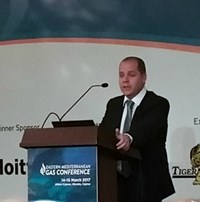EMGC '17: Eye on Cyprus—doing business on an island nation
NICOSIA -- Gulf Publishing Company's Eastern Mediterranean Gas Conference (EMGC) 2017, the world's primary event for discussing the forces shaping gas industry development in the Eastern Med, continued on March 15. Sessions covered a variety of topics, ranging from predicting energy demand, to the logistics of operating gas projects and boosting regional gas supplies, to the long-term future of the Eastern Med gas market.
In the second session of the morning, George Pantelides, partner and head of Consulting Services at Deloitte, next offered strategies for operators and service companies to overcome the challenges of operating in Cyprus. "One of the specific challenges that the oil and gas sector is facing, and one of the potential risks, is compliance with government regulations within regulatory frameworks," said Pantelides. "There are various gray areas in these frameworks. Also, the public perception of the industry is important. Public policies and regulatory frameworks have been affected by public expectations, and the expectation for oil and gas companies to commit to environmental care and contribute to the public standard of living."
Insufficient supply of qualified candidates, he noted, is another challenge for the oil and gas industry. Financing and capital effectiveness are also concerns, especially with regard to the standard of operations and investment demands of the oil and gas sector. Pantelides then discussed how the Cypriot government has created a dream of industrial prosperity and expansion on the island nation. "The local community has huge expectations, because of the dream that was communicated to them," he said. "There is an interest by both the government officials, and the local community, to create an energy hub to support the upcoming activities."
However, Cyprus faces a number of challenges in its industrial expansion, which it must "handle effectively" to meet government and public expectations. These challenges include evolving fiscal frameworks; a labor market that is well-educated, but characterized by lingering knowledge gaps in specific areas; insider threats; and the lack of a designated port for servicing the oil and gas industry. The Cypriot government must establish integrated learning solutions and talent strategies for attracting, selecting and acquiring top energy industry talent, Mr. Pantelides said.
However, among Cyprus' advantages as a potential energy hub, the consulting head named the country's strategic geographic location; a stable and reputable political and legal system; a developed academic system; strong EU and Eurozone membership; an advantageous legal and tax frameworks; and an excellent business infrastructure and environment. "I believe Cyprus is heading in the right direction," said Pantelides.
Please see additional stories posted on World Oil’s website for discussions of the remainder of the March 15 sessions.



